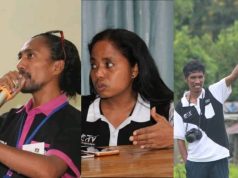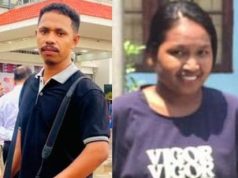Written by Citizen journalist Filipe Soares
A 24-year-old girl, Rosalia Pereira from Sahan sub-village, wenunuk village, the Administrative Post of Metinaro, the Municipality of Dili, is currently working at the Association of People with Disabilities (ADTL). She is physically-disabled and should use a wheel car, however it is not a barrier to her.
In an interview with a Timorese citizen journalist, Rosalia said the country’s electoral bodies, the National Election Commission (CNE) and Technical Secretariat for Electoral Administration (STAE) ought to prepare proper accessibilities at all polling centers for people with disabilities in a way that can help facilitate them to vote on the election day.
“I have not a physically-disabled since birth, but in 2009 I broke my leg in an accident, since then I have been physically-disabled and now I am in my wheel car. It was a long process to recover. I got in a car accident, the car that belonged to the diocese. I am a disabled, but I am committed to my spirit of volunteerism and I will keep up with it. I have to accept the reality and that is the thing I face,” She said.
According to her, no proper accessibilities at polling centers have been a huge barrier to people with disabilities and find it hard to exercise their rights, saying people with disabilities are vulnerable the most within society as they have been treated differently.
“On the voting day, especially for people with disabilities, it is considered to be a difficult time because there are no accessibilities, sometimes we have to ask for help. However, it is hard for visually-impaired citizens as they are not able to vote freely and secretly,” Rosalia said at ADTL Offices on Thursday (08/2022).
The obstacles that Rosalia and her physically-disabled friends experienced have emerged in a high spirit for them to keep fighting through advocacies in order to make no one left behind, saying the Government needs to prioritize an inclusive election for all the country’s citizens. She called on the Government to help facilitate them with so-called Kabu Tora at polling centers, so that people with disabilities can communicate with each other properly.
Other obstacles that they faced in the previous elections was the polling staff working were incapable of using gesture language and that made it hard for the hearing loss citizens. Therefore, Rosa who is also called Oza urged CNE and STAE to provide them with training on using braille letter, so that the polling staffs can help facilitate the visually-impaired citizens on the election day.
In the same situation, a young boy who is also engaged in providing advocacies on people with disabilities’ rights, calling on the Government to count on them in the elections. The young boy is Gabriel Oliverai de Araujo who is also a physically-disabled person, when meeting with him at his residence in Aimutin, he said it was necessary for the Government to count on people with disabilities’ voices as their votes were also useful, adding that an inclusive development is necessary indeed in the country.
“I find it very hard, especially for we the people with disabilities, we want to be like others who are not physically-disabled as every five year we have two elections, namely presidential and legislative elections. So, we the people with disabilities’ votes are useful. We always shout and cry by saying we want to be the same andto be treated equally. The places that are set as polling centers are difficult for us to easily access,” He said at his residence on Thursday (28/07/2022)
He explained that being a young Timorese he had the obligations to contribute to the development of the country through his vote in the elections, adding that he really wanted to see the future development of the country, however he said the improper accessibilities at polling centers did not facilitate them to vote freely and secretly, especially the visually-impaired citizens.
“On election day, our votes are not secret anymore, because the polling booths are too narrow for our wheel cars to go through. When we get ballot papers from the polling staff, we approach the polling booths to vote for leaders who we prefer, but the problem for us is that our votes are not secret anymore because I have to use my thighs to vote in the open space”, He said.
He stressed that the terms and language that were used to refer to people with disabilities at the polling center also shocked them whereas the advocacies in connection to the use of terms and language had been made many times, adding that some polling staff working at polling centers did not use the terms properly referring to people with disabilities.
“We are offended that on the election day the polling staff attended us with the language that shocked us at polling centers. They have been familiar with the term alejadu in Tetun language, which refers to physical defect. That is why, on behalf of people with disabilities, I would like to take the opportunity to urge the Government and the State to create proper conditions for people with disabilities to assure that their rights to vote are guaranteed,” He recommended.
In regard to this situation, Executive Director of the Association of People with Disabilities (ADTL), Cesario da Silva said participation of people with disabilities in the elections faced a greatest barrier, especially when getting access to polling centers on the election day, saying it was not only on the election day, but it began in the period of political campaigns at which people with disabilities also faced difficulties.
“We have been following such a situation so far, all polling centers have no proper accessibilities, the most for the physically-disabled persons. So, once people with disabilities arrive at the polling center, such a situation affects their mentality, it makes them have no self-confidence as the place is not dignifying them,” He said at ADTL Offices on Wednesday (03/08/2022).
Apart from this, he said people with disabilities’ access to exercise their rights to vote was not secret anymore and they were not able to vote independently because there were no proper accessibilities for them on the election day at polling centers.
“If physically-disabled persons need to be provided with accessible spaces and proper facilities, which can help facilitate them to move around, please provide them as they are in their wheel cars with a standard of maximum 90 cm. It really needs large spaces, which is also free for them to move well. These all need an attendiment with dignity, so they really need proper spaces not separated places”, Cesario said.
Adding that ADTL wanted to recommend to STAE and CNE in order to ensure people with disabilities’ rights were guaranteed and said they had also conveyed their recommendations through numbers of discussion, as well as through written documents they submitted to the National Parliament, especially the Parliamentary Committee A to amend the electoral law in order to treat people with disabilities with dignity when casting their votes on the election day, adding that proper conditions was also necessary to be provided for the country’s elderly.
According to a comparative data, number of people with disabilities in Timor-Leste are totally 38.118 comprising visually-impaired citizens with about 14.000, hearing loss citizens are 12.000, while physically-disabled persons are about 7000, and very little number are physiological and intellectual disabled persons with a total of 3000. s
Large populations of people with disabilities are in the Municipalities of Baucau, Ermera, Dili and Viqueque. Meanwhile, the approved data on people with disabilities male and female are about 25.000 that took part in the previous elections. Although they are physically-disabled, they were able to cast their votes like other citizens.
ADTL is recommending to all the political parties to ensure people with disabilities’ rights in the elections and should not use them as an instrument for political interest in the period of elections, calling on them to create proper conditions to help facilitate people with disabilities to take part in the country’s development.
In response, President of the National Election Commission (CNE), Jose Agustinho da Costa Belo said CNE’s role was to educate all the citizens of the country through civic education, saying based on CNE’s monitoring findings, it was true that there were no proper accessibilities provided for physically-disabled persons, visually-impaired citizens and hearing loss citizens at polling centers. Adding that they were not able to vote independently because they had to follow the person who helped them vote in the polling booths, therefore he said it was hard and the votes were irrational and were not accountable.
“We also had meetings with STAE, the Association of People with Disabilities. They presented what kind of facilities were needed on election day, how people with disabilities can use braille materials, so that they can vote based on their conscience in a way that the votes are considered to be rational, transparent and accountable. As the total number of people with disabilities is about 14.000, it is not a small number. Because we also had meetings with UNDP in order to send the Timorese people with disabilities to take part in training in Indonesia, so that they can transfer the skills that they gain to other people with disabilities on how to use the materials based on their functions,”He said.
Mr. José explained that the UN was currently fighting for human rights, especially fighting for people with disabilities’ rights in order to exercise their rights in the elections, adding that the UN Secretary-General was committed to endorsing people with disabilities for better access. Therefore, the international organizations wish to help support the country’s electoral bodies, such as CNE where they had recently financially funded the construction of buildings for people with disabilities in the municipalities, namely Baucau, Aileu and Covalima.
Meanwhile, Director-General STAE, Acelino Manuel Branco said the electoral process was inclusive, saying the opportunity was given to all the citizens and were treated equally either men or women, any kind of citizen, no classification was made based on any condition and any other aspect.
According to him, STAE/ CNE always promote civic education, electoral education throughout the national territory of the country to make public awareness of using their conscience to be part of the process because all the Timorese citizens have a right and their votes also determine the future of the nation.
Mr. Acelino added that in practice in certain situations the physically-disabled persons were not able to exercise their rights because of their physical condition, therefore they were not able to cast their votes.
He does believe that people with disabilities through the electoral process, especially when it refers to the electoral system, especially in ensuring the physicaly-disabled persons’ rights to cast their votes will be guaranteed.
Adding that STAE will not be silent, it will try to cooperate with the organizations of people with disabilities, such as RHTO and ADTL and some international stakeholders to make proper preparations properly, especially capacity building from UNDP for people with disabilities about reading documents, choices, saying it is a phase that can go through in order to achieve it forward slowly.









